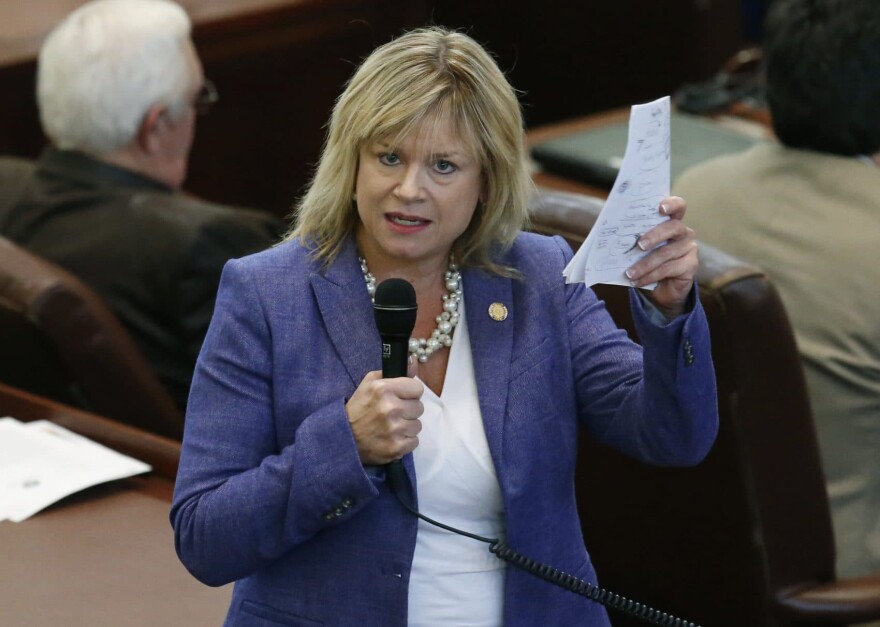Oklahoma has done something many political watchers didn’t think was possible: the Republican-controlled legislature has approved a tax increase to give teachers a pay raise.
Teachers in the state say they need more money, and they’ll stick to their planned walkout next week. The Department of Education is just one state agency that’s contending with a worsening budget crisis after years of tax cuts didn’t have the results state lawmakers were hoping for.
Here & Now‘s Jeremy Hobson speaks with state Rep. Leslie Osborn, a GOP lawmaker from Mustang, Oklahoma, who had a change of heart on tax cuts.
Interview Highlights
On where Oklahoma’s lack of tax revenue has been felt most
“Last year when I was appropriations chair in the house, I had a budget compiled on what we had actually done in cuts to our main core services in the last decade. And what it came up with was rather shocking: Except for the top two or three agencies — which would be the health care entities, Department of Human Services, education — what we had done is we have cut the other 85 percent of our agencies an average of 45 percent in the last decade. Now the first 15 or 20 percent, they may have been at a level where they needed to find some efficiencies, some streamlining, some public-private partnerships. But the last 15, 20 percent of those cuts have been devastating. So what we’re seeing is not enough foster care workers, Medicaid provider rates are perilously low, so that we are going to face closing rural hospitals and nursing homes. It’s a true crisis.”
On whether the crisis was caused by tax cuts
“I would call it a perfect storm. If you look at the last decade, what we did is we lowered taxes multiple times, down to 5 percent. So, remember that the first three, four tax cuts were done by a Republican legislature but signed by a Democrat governor, so we had some bipartisan support. We were looking for that dynamic effect — if you cut taxes, that people will hire more people in their businesses, they’ll buy more equipment, the economy will thrive. You’ll see a dynamic effect economically. I believe that worked the first couple of times. But then what we did is we weren’t looking at all the facts. We were trying to cut taxes to match Texas. Kansas and Oklahoma were doing this together, but what we weren’t doing was the rest of the story. The rest of the story is Texas’s property tax is two to three times higher than ours. Texas taxes services, we don’t. Texas taxes mineral rights, we don’t. So when you aren’t looking at a complete picture, we were cutting too far without all the facts.
“Now, after getting in and educating myself, I realized that several people had been right. So about three years ago, we started hearing from the treasurer, Ken Miller. He was telling us, ‘Guys, wait a minute, this experiment, it needs to be stopped.’ The second was the Secretary of Finance Preston Doerflinger, then [Gov. Mary Fallin], and I was rather vocal last year as the appropriations chair that even as a Republican, we had gone too far and it was time to start investing again in Oklahoma and trying to right the ship.”
On her ouster as appropriations chair in the state legislature
“Some believed that I went too far, that calling for revenue increases — even though it was never back to the point of where we started — made me a bad Republican. I personally like to believe that it made me a good Oklahoman, because if you invest in your future — your children, classroom sizes, teacher salaries, mental health funding, prison programming — those small buckets of money you invest in targeted areas pay off exponentially in lives and dollars down the road.”
On what she says to her colleagues who don’t want to raise taxes
“You know, it’s all about education. When I came in a decade ago … this is my 10th and last year in the legislature, because I’m leaving to run for a statewide office. But that being said, when we came in, we had 85 agencies. We’re down to 67. So see we’ve already streamlined, consolidated, we’ve found public-private partnerships. When I came in, we had 35,000 state employees. We’re down to 28,000, but with the same workload, because we have a growing population and new laws. All that shows that we have done the work, yet you hear the far-right rhetoric that says, ‘Well we just need to tighten the belt.’ Guys, we’ve tightened the belt way past the first notch. Now that never means that you don’t continue to look for efficiencies. But if you look at those facts, then you realize you’re only dealing with an ideologue.”
On whether she’d recommend lawmakers in Congress not pursue tax cuts at the federal level
“I will tell you, one thing I have absolutely no desire to do is ever be a federal congresswoman, so that’s above my purview. But I would say to be cautious. Now, in Oklahoma, I know we need to redo our tax code. It hasn’t been modernized since the ’30s and it’s still built on a model that is different from what we are now. We need a strong new governor to come in this fall and say, ‘Guys, we need to totally modernize our tax code in Oklahoma.’
I hope [that will happen]. I think it’s a pivotal time for a strong governor to come in and say, ‘Guys, it’s time to turn this around. We cannot be complacent about being 49th, 50th in all these indicators. We have to have a vision for our future.’ “
Copyright 2021 NPR. To see more, visit https://www.npr.org.







